Afghanistan
Islam: Muslims Divided Over Penalty For Apostasy

By Joyce Davis http://gdb.rferl.org/5F54343D-F0BE-4884-9196-E4FEBD3CC5D0_w203.jpg Afghan President Hamid Karzai at the funeral of Pope John Paul II in April 2005 (epa) Islamic scholars may agree that apostasy is a heinous crime, but they differ on whether the punishment should be death.
How Afghanistan deals with the case of Abdul Rahman, the former Muslim turned Christian who is standing trial in Kabul for apostasy, is being closely watched around the globe, and could have a profound impact on the interpretation of Islamic law in the modern world.
If Afghan President Hamid Karzai's reported promise to Canadian Prime Minister Stephen Harper holds true and Rahman is set free, it will be another blow to extremists who try to use Islam to promote division and intolerance.
And a decision to free Rahman could embolden Muslim moderates in their vision of Islam as a force for human rights and peace.
A Crime, But What Punishment?
The issue of apostasy, when a Muslim converts to another religion, is one of the most sensitive areas of Islamic law. But there is no one authority in Islam, and the four main schools of Islamic thought differ on fundamental religious issues. So Muslims are left to decide which of a myriad of interpretations to accept on issues such as abortion, polygamy, divorce, homosexuality -- and, arguably most importantly of all, apostasy.
Muslim scholars agree that Islam respects Christians and Jews as "people of The Book," who share a common heritage with Islam. And they agree that Islam does not support forced conversion or religious belief. To support this view Muslim scholars frequently quote the Koran (Al-Baqarah, 2:256): "Let there be no compulsion in religion."
Yet key Muslim jurists throughout history have agreed on one point: apostasy -- turning away from Islam to accept Judaism, Christianity, or any other religion -- is one of the worst crimes in Islam. They consider it treason against the Muslim community and against God.
To support this view, Muslim scholars also turn to the Koran (Muhammad, 47:34): "Lo! Those who disbelieve and turn from the way of Allah and then die disbelievers, Allah surely will not pardon them."
The key issue for Muslim thinkers grappling with Islamic law and modernity revolves not around whether apostasy is a heinous crime, but how to deal with it. Islam Online, a Qatar-based website that attempts to explain Islamic issues, quoted the well-known Islamic scholar Sheikh Yusuf al-Qaradawi as acknowledging that there is a difference of opinion on the issue even if most support the death penalty.
"All Muslim jurists agree that the apostate is to be punished," al-Qaradawi said. "However, they differ regarding the punishment itself. The majority of them go for killing; meaning that an apostate is to be sentenced to death."
While this position may seem brutal to Westerners, Muslim scholars note that there are -- or have been -- similar attitudes in the United States and Europe toward treason, albeit treason against the state. And many countries, including the United States, have punished traitors with death. Many Muslims argue that treason against God deserves no less a punishment.
Who Should Carry Out The Punishment?
Yet, as al-Qaradawi's statement suggests, Muslim scholars are not unanimous on this point. There are those who argue that even if apostasy does warrant death, a question remains: Who is authorized to carry it out?
Sheikh Muhammad al-Gazali, a renowned Egyptian religious scholar who died in March 1996, ignited a debate within Islamic circles on the question of apostasy when he testified, in July 1993, at the trial of 13 Islamic militants accused of killing the Egyptian writer Farag Foda. Foda was an outspoken critic of radical Islamists, who accused him of apostasy. Al-Ghazali ruled than an apostate should be given time to repent. But his support of ultimately carrying out a death penatly roused other scholars to argue for leniency and a reinterpretation of Islamic law on this issue.
The Koran is not explicit on this point, however. And many Muslim scholars argue that punishment for apostates and blasphemers is not be exacted on earth, but by God. They point to a verse in the Koran (Nisa Ayah, 48) that speaks only of Allah's retribution: "Those who blasphemed and back away from the ways of Allah and die as blasphemers, Allah shall not forgive them."
Ibrahim Syed, president of the Islamic Research Foundation International, based in Louisville, Kentucky, believes that verse supports more lenient interpretations on apostasy. "One grave misunderstanding of Islamic beliefs over the years is that Islam doesn't tolerate apostasy," he wrote in the article, "Shari'a: Is Killing An Apostate In Islamic Law?" published on the Internet site TheAmericanMuslim.org.
"A Sunni Muslim reads the Koran in the Um Al-Qura mosque in Baghdad (epa)Islamic scholars from past centuries -- Ibrahim al-Naka'i, Sufyan al-Thawri, Shams al-Din al-Sarakhsi, Abul Walid al-Baji, and Ibn Taymiyyah -- have all held that apostasy is a serious sin, but not one that requires the death penalty," Syed wrote.
Specifically, Syed noted the words of the respected scholar in the history of Islamic jurisprudence, Shamsuddeen al-Sarakhshi, who stated, "renunciation of the faith and conversion to disbelief is admittedly the greatest of offences, yet it is a matter between man and his Creator, and its punishment is postponed to the Day of Judgment."
Shah Abdul Halim, chairman of the Islamic Information Bureau of Bangladesh, states in the article "Islam And Pluralism – A Contemporary Approach," published on umma.com, that the Prophet Muhammad when he lived showed great tolerance to those who turned away from Islam.
"The Prophet never put anyone to death for apostasy alone rather he let such a person go unharmed. No one was sentenced to death solely for renunciation of the faith, unless [it was] accompanied by hostility and treason or was linked to an act of political betrayal of the community."
Scholars discussing apostasy in a forum on Islam Online support the more lenient interpretation and also argued against vigilantism in carrying out Islamic law. In the Afghan case, it is a very real threat even if Abdul Rahman is freed by the courts, individuals may try to kill him, believing it is their duty to defend Islam.
"If this were to happen, such reckless action would only lead to a vicious circle of murder and homicide in which case a great deal of innocent people would be injured," scholars wrote on Islam Online.
The Right To Disbelieve
In his arguments against using apostasy to promote intolerance, Syed spoke directly to the hearts of believers in an article published in April 2005 on IslamicVoice.com.
According to Syed, the best example on how to deal with apostasy was set by Muhammad himself: "There was a case at the time of the Prophet when a man came to him in three consecutive days and told him that he wanted to apostate. The Prophet (peace and blessings be upon him) never took any action against him and when the man finally left Medina, the Prophet (peace and blessings be upon him) never sent anyone to arrest him, let alone kill him."
Syed and other Islamic scholars who support tolerance also note this guidance offered in the Koran (Al-Kahf, 29): "Let he who wishes to believe, do so; and let he who wishes to disbelieve, do so."
More News
For Afghan Refugees In Pakistan, A 'Cruel' Countdown Has Begun
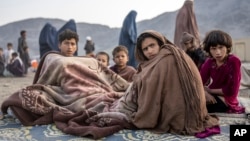
Pakistan’s plan to deport millions of Afghan migrants has drawn sharp criticism as the country begins implementing its controversial policy.
Rights groups warn that many returnees face severe risks in Taliban-controlled Afghanistan, including persecution, violence, and economic hardship. Vulnerable individuals such as women, journalists, human rights defenders, and former government officials are particularly at risk.
The government had initially set March 31 as the deadline for Afghan migrants to leave voluntarily or face deportation. However, the deadline was postponed until April 10 due to the Eid al-Fitr holidays marking the end of Ramadan, officials said.
The delay provides a brief reprieve for tens of thousands of Afghans but does not alter the government’s goal of expelling up to 3 million migrants by the end of the year.
Meanwhile, around 40,000 Afghans in Pakistan await uncertain resettlement to third countries, mostly in the West. Many fled after the Taliban’s 2021 return, fearing retribution due to ties with the United States, NATO, and other Western organizations.
Who Is Being Deported?
The deportation campaign targets Afghan Citizen Card (ACC) holders, undocumented individuals, and those who arrived after the Taliban’s return to power.
There are around 800,000 ACC card holders and 1.4 million Afghans who have been issued Proof of Registration (POR) cards by the UN refugee agency. POR card holders are not yet being deported, Pakistani officials say, as their permits expire in June.
ACC holders are granted temporary permission to reside in Pakistan, but the validity and duration of their stay are determined by the federal government. Unlike POR cardholders, ACC holders do not have guaranteed protections against deportation beyond the government’s specified deadlines.
This poses another problem, as members of the same family can hold different immigration statuses.
That’s the case for Rehmat Khan, a man in his 50s who is facing immediate deportation because he is an ACC card holder, while the other members of his family are POR card holders.
“I don’t know how I can leave my family behind, and I don’t know who will support them when I am deported to Afghanistan,” he told RFE/RL’s Radio Mashaal.
Rehmat Khan is one of approximately 20,000 Afghans who live in Jalala refugee camp, some 150 kilometers northwest of Islamabad. Residents of the camp have been formally notified to prepare to leave.
Most of the Afghans in the camp are descendants of refugees who migrated to Pakistan after the Soviet invasion of Afghanistan in 1979. Many are in their 30s, meaning they have never lived in Afghanistan and consider Pakistan their home.
The camp functions as a small village, with several schools, houses mostly made of mud, and a makeshift bazaar.
“I am in 11th grade. Sending me back to Afghanistan at this point in the school year will ruin my future,” a student who asked to remain anonymous for security reasons told Radio Mashaal. “There are no educational opportunities there, and I am unfamiliar with the education system. I was born and raised here, and I know this place better than Afghanistan.”
A holding camp to process the relocation of refugees has been established in Landi Kotal in Peshawar, where Frontier Corps paramilitary forces and local police are deployed.
While no refugees are currently housed in the camp, officials expect an influx of families in the coming days as the repatriation process gains momentum.
Rights Groups Alarmed by ‘Cruel’ Deadline
The United Nations has expressed alarm over the plan, warning that some people would be at risk once in Afghanistan.
“We urge Pakistan to continue to provide safety to Afghans at risk, irrespective of their documentation status,” said Philippa Candler, UNHCR's country representative, said in a statement on February 5, when the initial deadline was set.
Amnesty International has also condemned the deportations, calling them a violation of international human rights law.
“The Pakistani government’s unyielding and cruel deadline to remove Afghan refugees shows little respect for international human rights law, particularly the principle of non-refoulement,” Amnesty’s deputy regional director for South Asia, Isabelle Lassee, said on March 26.
She added that portraying Afghan refugees as a threat is “disingenuous” and scapegoats a community that has fled persecution.
Despite mounting criticism, Pakistani officials defend the policy as necessary for national security and resource management.
The Pakistani government has often blamed militant violence and criminal activity on Afghan citizens, allegations rejected by the extremist Taliban-led government in Kabul.
Masses Of Afghans Being Deported From Pakistan Face Angst And Uncertainty
With Pakistan beginning to enforce a deportation deadline that passed on March 31, hundreds of thousands of Afghans who fled the Taliban's takeover in 2021 now face an uncertain future. Other Afghans have lived in Pakistan's Mardan camp for generations, and many have never lived in Afghanistan. Some have established businesses in the camp that they say could never function under a ruined, Taliban-run economy.
Hundreds Of Thousands Of Afghans In Pakistan Brace For Deportations

More than 800,000 Afghans who fled Afghanistan after the Taliban’s takeover in 2021 live without papers in neighboring Pakistan.
These undocumented Afghan refugees and migrants face a rapidly approaching deportation order issued by Islamabad requiring them to leave the country by March 31.
Another 1.4 million Afghans who are formally registered with the Pakistani government and who hold a Proof of Residence card issued by the UN refugee agency (UNHCR) have until June 30 to return to their homeland. Many have lived in Pakistan for decades.
The fate of an additional 40,000 Afghans who are waiting to be resettled to third countries, mostly in the West, is unclear.
Pakistan initially said these at-risk Afghans, a group that includes activists, journalists, and former members of the defunct Western-backed Afghan government and its armed forces, must leave or face deportation by March 31. But a source at the Pakistani Interior Ministry told RFE/RL’s Radio Mashaal that the deadline for them to leave the country has been extended to June 30.
Among this group are some 15,000 Afghans who are waiting to be resettled in the United States, although their status remains unclear after President Donald Trump's administration announced that the US Refugee Admissions Program (USRAP) would be suspended for at least three months starting on January 27.
“We are left in a deep despair,” said Hina, a 25-year-old Afghan woman who lives with her family in the northwestern Pakistani city of Peshawar.
Her family had been cleared for resettlement in the United States and even booked their flights from Islamabad. But now they are in limbo.
“Our dreams of building a safe future [in the United States] have been shattered,” added Hina. “We can’t return to Afghanistan where our lives will be at risk, nor can we build a stable life in Pakistan.”
Growing Fears
Pakistan has already forcibly deported more than 800,000 undocumented Afghans since 2023, when it launched a major crackdown, according to the UN.
The deportees have returned to a country gripped by devastating humanitarian and economic crises, and many have struggled to access shelter, health care, and food and water.
The deportations have coincided with tensions soaring between the unrecognized Taliban government in Afghanistan and Pakistan.
Islamabad has accused the Taliban of sheltering Pakistani militants, a claim rejected by the Afghan militant group.
Ahead of the March 31 deadline, Pakistani police conducted night raids and arbitrarily detained and arrested hundreds of Afghan refugees in the capital, Islamabad, and the nearby city of Rawalpindi, according to international rights groups.
Videos shared on social media show Pakistani police using loudspeakers to order undocumented Afghans to leave Islamabad.
"The problem is that our children go to school here and we have jobs here,” Obaidullah, an undocumented Afghan refugee living in Peshawar, told RFE/RL’s Radio Azadi. “What will we do in Afghanistan?”
Dire Situation
The tens of thousands of Afghans who are awaiting resettlement abroad face a race against time.
Many of them are in a dire financial situation in Pakistan, said Maiwand Alami, who leads an NGO to help Afghan refugees in Islamabad.
“They have sold their homes in Afghanistan, but that money has since run out,” Alami told RFE/RL. “But [their] biggest problem is uncertainty about their immigration cases. Everybody is anxious about it.”
“Afghans in Pakistan are now required to extend their stay every month. It costs 20,000 rupees [about $71] per person which is a lot of money here, especially if you don’t have any income,” Alami said.
The resettlement of Afghans to the West is uncertain amid increasingly anti-migrant sentiment across Europe and the United States.
Trump said the United States “lacks the ability to absorb large numbers of migrants, and in particular, refugees into its communities in a manner that does not compromise the availability of resources for Americans.”
He ordered the suspension of USRAP “until such time as the further entry into the United States of refugees aligns with the interests of the United States.”
- By RFE/RL
American Woman Freed By Taliban, Second Release Of US Hostage In 8 Days
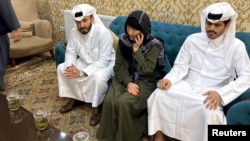
An American woman has been released by the Taliban rulers in Afghanistan after being detained since February, the second freeing of a US citizen in the past eight days.
In a video posted by US President Donald Trump on March 29, Faye Hall said she had been released by the Taliban after being detained in the war-torn country last month.
"I've never been so proud to be an American citizen," Hall said in the video. "Thank you, Mr President…God bless you."
Trump thanked Hall for the comments and added: "So honored with your words!"
Former U.S. Special Representative to Afghanistan Zalmay Khalilzad first announced the release hours earlier on X, saying it had occurred on March 27. He said she was in the care of the Qatari delegation in Kabul.
"American citizen Faye Hall, just released by the Taliban, is now in the care of our friends, the Qataris in Kabul, and will soon be on her way home," said Khalilzad, who has been part of a US team seeking the release of hostages held by the Taliban.
The development came a week after George Glezmann, 66, was released from detention in Kabul following the first visit by a senior US official to Afghanistan since the Taliban seized power in the wake of the withdrawal of international troops in August 2021.
Hall had been detained in February while with a British couple in their 70s, Barbie and Peter Reynolds.
British media said the Reynolds had been operating school projects in Afghanistan for 18 years and had remained in the country despite the Taliban’s return to power.
Reuters quoted a US official as saying Adam Boehler, Washington's special envoy for hostage affairs, had worked with Qatari officials and others to win Hall’s release.
There was no immediate information on the British couple. Their daughter has pleaded for their release, citing health concerns.
Several Americans are still detained in Afghanistan.
Upon his release, Glezmann also thanked Trump, Secretary of State Marco Rubio, and others who helped free him.
He told Fox News he was abducted in the streets of Kabul and thrown "into a dungeon with no windows no nothing."
Two other Americans held in Afghanistan were exchanged in late January for a Taliban man imprisoned for life in California on drug and terrorism charges.
Ryan Corbett and William McKenty were swapped for Khan Mohammed, who was sentenced to two life terms in 2008 and was incarcerated in a US prison.
Aid worker Corbett, 40, and Mahmood Habibi, 37 -- who led the Afghan Aviation Authority under the previous Afghan government -- were detained separately in August 2022.
The world community has not recognized the Taliban as the legitimate rulers of Afghanistan, although some countries -- including Russia, China, and Turkey -- still maintain embassies in Kabul.
Qatar has also maintained direct contact with the Taliban and has helped broker negotiations for the release of US hostages.
Amid poverty and unrest in the country, the Taliban rulers have made moves to open ties with the rest of the world. Western nations are reluctant to engage with the extremist group amid complaints of widespread human rights violations, especially against girls and women.
With reporting by RFE/RL's Radio Azadi, Reuters, AFP, and AP
Millions Of Afghan Girls Barred From School For Fourth Consecutive Year
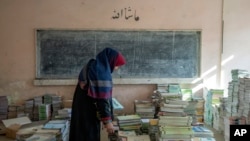
The new school year started in Afghanistan on March 22, but for the fourth consecutive year, millions of teenage girls were barred from attending classes.
Among them was Khalida, who was in the ninth grade when the Taliban seized power and banned education for girls above 12 years old.
“The ban has had a big impact on my life,” Khalida, now 18, told RFE/RL’s Radio Azadi. “I used to spend all my time on my studies. Now my time passes aimlessly.”
The school ban has had a catastrophic impact on an estimated 2.2 million girls in Afghanistan, where the Taliban has erased women from public life and severely restricted their fundamental rights.
There has been a surge in forced, early, and child marriages. Child marriages have increased by around 25 percent since the Taliban takeover, according to the UN.
The lack of educational and professional prospects for women has fueled a rise in female suicides, making the country one of the few in the world where more women take their own lives than men.
"The lack of access to education not only threatens our future but also hinders our country from progress and development,” said another teenage Afghan girl, who spoke on condition of anonymity for fear of retribution.
“We have the right to study, progress, and have a bright future," she told Radio Azadi.
UNICEF, the UN's children's agency, said the repercussions of the school ban will last for generations.
“The ban negatively impacts the health system, the economy, and the future of the nation,” UNICEF said in a March 22 statement.
“With fewer girls receiving an education, girls face a higher risk of child marriage with negative repercussions on their well-being and health.”
The agency warned that over 4 million girls will be out of school if the ban lasts until 2030.
Calls To Do More
Senior UN officials and Afghan female activists have termed the Taliban’s treatment of Afghan girls and women as “gender apartheid.”
They have called for the international community to put more pressure on the Taliban to reverse its ban on education for girls beyond the sixth grade.
No country has recognized the Taliban’s government, which is under international sanctions. But a growing number of countries, including some in the West, are cooperating with its government on trade, security-related issues, and immigration.
"The Taliban still go around and travel freely,” said Pashtana Durrani, a prominent Afghan education activist who lives in exile.
“They give interviews. They have bank accounts. Their families live abroad yet they have banned Afghan women from getting an education.”
She added: “The international community should be asked whether they truly want the Taliban to open girls’ schools or not?”
Uncertainty Clouds The Future Of Thousands Of Afghans Seeking US Migration
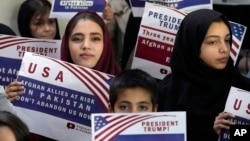
For over three years, Syed Abdul Samad Muzoon, a middle-aged former Afghan security official, has lived with his wife and their teenage daughter in Pakistan to pursue immigration to the United States.
During Washington’s nearly two-decade-long war in Afghanistan, he worked for the Afghan security forces in sensitive roles, he said, helping the US war effort.
Yet, there is still no clarity on whether they will ever be able to make a fresh start in the United States because of new curbs on immigration.
In January, hundreds of Afghans cleared for resettlement in the United States were prevented from traveling to the country after President Donald Trump immediately suspended Washington’s refugee program and foreign aid after assuming office on January 20.
On February 18, Reuters reported that the State Department's program to manage Afghan resettlement in the United States will be shut down in April.
Media reports suggest that the Trump administration could impose a new travel ban to bar the entry of people from Afghanistan and Pakistan, which would close all pathways for Afghans to move to the United States.
The State Department, however, disputes this. “There is no list,” Tammy Bruce, its spokesperson, told journalists on March 17.
Trump has been elected twice on an anti-immigration platform. In a Gallup poll from 2024, a majority of Americans (55 percent) said that they believed there should be less immigration to the United States.
Since the chaotic US withdrawal from Afghanistan in August 2021, Washington has helped some 200,000 Afghans resettle.
But Muzoon and many more Afghans might never have a chance to begin a new life in the United States. Tens of thousands of them have been living in Pakistan, Qatar, Albania, and other countries for years as they wait for a final decision on their refugee and immigration cases. Fearing retribution by the Taliban, many are fearful of returning to Afghanistan.
'Extreme Predicament'
Advocacy groups estimate that up to 200,000 more Afghans may be eligible for US immigration. Meanwhile, after reviewing government documents, CBS reported that more than 40,000 Afghans who have already been cleared to leave the country are now stranded.
“I and other Afghan refugees here are in an extreme predicament,” Muzoon said.
Since late 2023, Pakistan has expelled more than 800,000 Afghans, and in the capital, Islamabad, Afghans face constant harassment and police brutality.
Muzoon and 20,000 more Afghans in Islamabad now fear repatriation to Afghanistan after the Pakistani government announced it would forcefully deport some 1.5 million documented and undocumented Afghans if they fail to leave by the end of this month.
“I am suffering from the uncertainty and the seemingly endless wait for our cases,” he said.
Muzoon said threats to his life and family prompted him to flee Afghanistan soon after the Taliban seized the Afghan capital, Kabul, on August 15, 2021, as it toppled the pro-western Afghan republic.
He is among more than half a million Afghans, mostly educated professionals and officials who were integral to running the Afghan republic, who fled the Taliban’s takeover.
Most feared being persecuted for working with the US-led international forces in Afghanistan. Others were senior officials in the Afghan government or worked in the civil society sector.
Three years on, those still waiting for a decision on their US immigration are stuck.
“We are living in extreme despair,” said Maiwand Alami Afghan. He leads an informal association of Afghan refugees in Islamabad.
'Hanging By A Thread'
He said most families in Islamabad sold their properties and belongings in Afghanistan, but that money is now running out.
“Most of us are hanging by a thread,” he said.
Afghan said he had worked for US-funded development projects, which, he fears, makes it impossible for him to return to Afghanistan because the Taliban have persecuted some Afghans associated with the US presence in the country.
“We will still be refugees in our own country, because we don’t have a house, job, or any prospects to earn a livelihood,” he said.
Washington, however, does not look like it will be welcoming any more migrants. During his election campaign, President Trump promised stricter controls on immigration.
In his speech to Congress on March 4, Trump said his administration “has launched the most sweeping border and immigration crackdown in American history.”
Steps taken by Trump after taking office have effectively blocked or suspended the two primary routes for Afghans to immigrate to the United States.
Under the Special Immigration Visa (SIV), Afghans who worked directly for the US government, such as embassy staff or translators for its forces, qualify for relocation. Afghans granted visas under this program can still relocate to the US without financial assistance from Washington, according to Afghans seeking relocation under the program.
“Those who have assisted us and worked with us, that’s been a policy and a dynamic that we’ve worked on from certainly even the previous administration, working to try to get that happening,” said Bruce, the State Department spokesperson.
The refugee program, which enabled former Afghan government officials, lawmakers, and civil society figures to immigrate to the US, is suspended for the next couple of months.
However, the suspension of the State Department's Afghan resettlement program has rattled Americans involved in or supporting the initiative.
“Right now, there's a lot of uncertainty,” said Shawn VanDiver, head of the Afghan Evacuation Association, a coalition of US veterans and advocacy groups that support Afghan resettlement.
'Nothing But Problems And Worries'
VanDiver is now lobbying the US Congress to remove the “complete stop” Trump’s executive orders have put on Afghan resettlement. He says that Congress had authorized Afghan resettlement through December 2027.
“President Trump needs to listen to the voices,” he said, pointing to the bipartisan support in Congress, veterans and service members, who want the immigration of Afghans to continue.
In a statement on March 18, the Afghan Evacuation Association said the ambiguity surrounding the immigration of Afghans “is unnecessary and cruel”. It called on Washington to provide “clear and unequivocal answers” to its wartime Afghan allies.
In media statements and letters, scores of lawmakers have urged President Trump to “fully restore humanitarian and refugee protections for our Afghan allies.”
Several courts across the United States are hearing cases regarding refugee and foreign aid suspensions. Some have issued injunctions against Trump’s executive orders.
A State Department spokesperson, speaking on condition of anonymity, said, “At this time, no decisions have been made” about its Afghan relocation program.
The spokesman said the department is “considering” the future of its Afghan relocation program, officially called Enduring Welcome and the Office of the Coordinator for Afghan Relocation Efforts (CARE).
The spokesperson noted that it “continues to provide life-sustaining support to Afghan allies and partners previously relocated to our overseas case-processing platforms.”
In Islamabad, Muzoon has little understanding of how his future will unfold amid the domestic US wrangling over the fate of Afghans seeking immigration to the country.
He hopes to avoid being deported back to Afghanistan. He wants to move to the United States to send his daughter to school, treat his wife’s depression, and seek some treatment for his heart ailment.
“I have nothing but problems and worries,” he said.
- By RFE/RL
UN Children's Agency Calls On Taliban To Lift Ban On Girls' Education
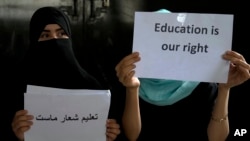
The UN children’s agency has urged Afghanistan’s Taliban-led government to immediately lift a ban on girls' education beyond primary school, saying that if the ban continues until 2030 more than 4 million girls will have been deprived of their right to education.
Afghanistan's ban on girls' secondary education "continues to harm the future of millions of Afghan girls," UNICEF Executive Director Catherine Russell said in a statement on March 22. “The consequences for these girls -- and for Afghanistan -- are catastrophic.”
The appeal by UNICEF comes as a new school year began in Afghanistan, where girls beyond sixth grade have been deprived of their right to education since the Taliban returned to power in 2021.
The Taliban justifies the ban, saying the education of girls beyond the sixth grade doesn't comply with their interpretation of Shari’a law.
Russell called for all girls to be allowed to return to school.
“Afghanistan is the only country in the world that bans female secondary and higher education,” Russell said in the statement, adding that if the rights of young girls continue to be denied, “the repercussions will last for generations.”
She pointed out that the ban negatively impacts the health system, the economy, and the future of the nation.
“With fewer girls receiving an education, girls face a higher risk of child marriage with negative repercussions on their well-being and health,” she said.
The consequences of the ban will affect the number of female doctors and midwives, and this in turn will leave women and girls without crucial medical care.
UNICEF projects an estimated 1,600 additional maternal deaths and over 3,500 infant deaths because of the situation.
The Taliban has allowed limited exceptions to the ban in the health and education sectors, but these jobs come with severe restrictions and the number of women in the workforce continues to fall, according to the United Nations.
Pakistan hosted a global conference in January at which Nobel laureate Malala Yousafzai condemned the state of women’s and girls' rights in Afghanistan as gender apartheid.
Yousafzai urged Muslim leaders not to "legitimize" the Taliban-led government and instead to "raise their voices" and "use [their] power" against the militant group's curbs on women and girls' education.
"Simply put, the Taliban do not see women as human beings. They cloak their crimes in cultural and religious justification," Yousafzai told the gathering in Islamabad.
With reporting by AP
- By RFE/RL
American Glezmann Returns Home After 2-Year Detention In Afghanistan

George Glezmann, an American who was released from detention in Afghanistan on March 20, has arrived in the United States and been reunited with his wife, a State Department spokesperson said.
Spokeswoman Tammy Bruce said on March 21 that Ryan Corbett, another former American prisoner in Afghanistan who had been held in the same cell as Glezmann, was in a welcoming party for Glezmann at Joint Base Andrews outside Washington.
"After a brief ceremony, George and [his wife] Aleksandra flew to another location in the United States to rest and recover," Bruce told reporters at a regular State Department news briefing.
Glezmann, 66, was released from detention in Kabul following the first visit by a senior US official to Afghanistan since the Taliban seized power in the wake of the withdrawal of international troops from the war-torn country in August 2021.
Former US special envoy for Afghanistan Zalmay Khalilzad said on X that he and Adam Boehler, a senior adviser at the Office of the Special Presidential Envoy for Hostage Affairs, met with Taliban officials in Kabul on March 20.
"We succeeded in obtaining the release of an American citizen, George Glezmann, after two years in detention in Kabul. The Taliban government agreed to free him as a goodwill gesture to [President Donald Trump] and the American people," Khalilzad said.
Details of the negotiations were not revealed. The United States, like most countries, does not recognize the Taliban as the legitimate rulers of Afghanistan.
“I feel like born again,” Glezmann said on Fox News after arriving at Joint Base Andrews. “I’m just thankful. I’ve got no word to express my gratitude for my liberty for my freedom.”
Glezmann also thanked President Donald Trump, Secretary of State Marco Rubio, and others who helped free him, he said on Fox News, recalling how he was abducted in the streets of Kabul and thrown "into a dungeon with no windows no nothing."
Boehler told Fox News he expects to see more Americans released.
“The Taliban understand that there is a new sheriff in town. That president Trump is that new sheriff and that’s why you are seeing something like this," he said.
One of the other US citizens being held in Afghanistan is Mahmood Habibi, who also has been held since 2022.
Glezmann, an airline mechanic from Atlanta, was taken into custody by Taliban authorities while on a tourist visit to Afghanistan in December 2022 and had been deemed wrongfully detained by the US government.
Rubio called Glezmann's release "a positive and constructive step" that was aided by officials in Qatar, which has often hosted negotiations between Washington and the Taliban.
"It is also a reminder that other Americans are still detained in Afghanistan," he added.
The release comes two months after two other Americans held in Afghanistan were exchanged for a Taliban man imprisoned for life in California on drug and terrorism charges.
Ryan Corbett and William McKenty were swapped for Khan Mohammed, who was sentenced to two life terms in 2008 and was incarcerated in a US prison.
Aid worker Corbett, 40, and Habibi, 37 -- who led the Afghan Aviation Authority under the previous Afghan government -- were detained separately in August 2022.
Undocumented Afghans In Iran Face Uncertain Future Amid New Restrictions
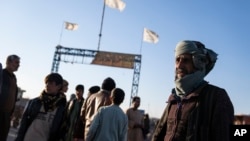
Millions of Afghans in Iran face an uncertain future as Tehran prepares to implement sweeping restrictions that will cut off access to health care, education, housing, and other essential services for undocumented immigrants.
The new policy, set to take effect on March 21, has left many Afghans grappling with impossible choices between a hostile host country and an unstable homeland.
For Rasheed, an Afghan immigrant living in Iran, the consequences of these policies have already hit home.
Rasheed recently returned to Afghanistan after doctors in Iran refused to treat his elderly mother for her heart disease.
“I was told to return to Afghanistan because Afghans were not supposed to get any treatment here,” Rasheed recalled of his conversation with an official at a government hospital in Tehran.
“My mother’s condition was rapidly deteriorating, which prompted me to return to my country,” he told RFE/RL’s Radio Azadi. Rasheed requested that his real name be withheld to protect his identity.
In Karaj, a city near Tehran, Ehsan Zia, another Afghan immigrant, is devastated that his two teenage daughters can no longer attend school.
“Our hopes have been dashed,” he told Radio Azadi. “Even here, my daughters are being deprived of education.”
Zia moved to Iran three years ago after the Taliban banned teenage girls from attending school following their return to power in Afghanistan in August 2021. Despite having a legal visa to stay in Iran, Zia says he has been unable to enroll his daughters in school due to bureaucratic obstacles and shifting policies.
Who Will Be Affected By The New Policy?
Earlier this month, the Center for Aliens and Foreign Immigrants’ Affairs (CAFIA) at Iran’s Interior Ministry announced six categories of Afghans who will remain eligible for key services under the new rules.
These include Afghans registered as refugees, those with valid visas or work permits, former employees of the Western-backed Afghan government that was toppled by the Taliban, and families with school-going children who apply for visas.
Tehran has already deported more than 2 million Afghans over the past two years as part of a campaign targeting undocumented immigrants.
Nader Yarahmadi, head of CAFIA, defended the government’s move, telling the semiofficial ISNA news agency that “there is no obstacle to returning [to Afghanistan] due to the relative stability and declared policies of the current Afghan government.”
The United Nations' refugee agency, UNHCR, estimates that that some 4 million Afghans live in Iran, including more than 2 million undocumented migrants. Figures cited by Iranian officials and media vary widely, with some claiming that 8 million Afghans reside in Iran.
Risking Tensions With The Taliban
The crackdown on undocumented Afghans has coincided with rising anti-Afghan sentiment in Iran. Impoverished Afghan migrants are often scapegoated for crimes, insecurity, and unemployment. Such views have fueled mob violence against Afghans as well as mass arrests and brutal treatment by Iranian police and border security forces.
“Cutting off basic services to migrants will disrupt the labor market and drive more people into the underground economy,” said Graeme Smith, senior Afghanistan analyst at the Brussels-based International Crisis Group.
Afghan migrants make up a significant portion of Iran’s labor force in agriculture and construction -- sectors that could suffer if undocumented workers are expelled en masse.
Smith also warned that Tehran’s policies could worsen tensions between Iran and Afghanistan. The Taliban government has already clashed with neighboring Pakistan over its treatment of Afghan refugees.
“The Taliban may feel provoked to respond, for example, with restrictions on water sharing,” Smith said, referring to a long-standing dispute over water rights.
Experts argue that Tehran’s approach could backfire, both economically and geopolitically. An isolated and heavily sanctioned Iran needs stable relations with Afghanistan’s Taliban government to expand trade ties, maintain border security, and build a more integrated regional economy.
“Not only will this cause suffering for the Afghans affected,” Smith noted, “but it’s a self-defeating policy for Tehran.”
American Glezmann Released By Taliban After Visit To Kabul By Senior US Official

US citizen George Glezmann has been released from detention in Kabul following the first visit by a senior US official to Afghanistan since the Taliban seized power in Afghanistan in the wake of the withdrawal of international troops from the war-torn country in August 2021.
Former U.S. special envoy for Afghanistan Zalmay Khalilzad said in a post on X that after he and Adam Boehler, a senior adviser at the Office of the Special Presidential Envoy for Hostage Affairs, met with Taliban officials on March 20, the 66-year-old Glezmann was "on his way home to his family."
"We succeeded in obtaining the release of an American citizen, George Glezmann, after two years in detention in Kabul. The Taliban government agreed to free him as a goodwill gesture to [President Donald Trump] and the American people," Khalilzad said.
Details of the negotiations were not revealed. The United States, like most countries, does not recognize the Taliban as the legitimate rulers of Afghanistan.
No mention was made of another US citizen being held by the Taliban, George Mahmood Habibi, who also has been held in Afghanistan since 2022.
Glezmann, an airline mechanic from Atlanta, was taken into custody by Taliban authorities while on a tourist visit to Afghanistan in December 2022 and had been deemed wrongfully detained by the US government.
Secretary of State Marco Rubio later confirmed the release, calling it "a positive and constructive step" that was aided by officials in Qatar, which has often hosted negotiations between Washington and the Taliban.
"It is also a reminder that other Americans are still detained in Afghanistan," he added.
The release comes two months after two other Americans held in Afghanistan were exchanged for a Taliban man imprisoned for life in California on drug and terrorism charges.
Ryan Corbett and William McKenty were swapped for Khan Mohammed, who was sentenced to two life terms in 2008 and was incarcerated in a US prison.
Aid worker Corbett, 40, and Habibi, 37 -- who led the Afghan Aviation Authority under the previous Afghan government -- were detained separately in August 2022.
- By RFE/RL
RFE/RL Audiences Voice Support For Its Journalism -- And Fears For Its Future

Amid an attempt by US President Donald Trump’s administration to halt congressionally allocated funding from Radio Free Europe/Radio Liberty (RFE/RL), the broadcaster’s audiences in the countries it covers are voicing support and admiration for its journalism.
From Iran to Belarus, Afghanistan to Russia, Pakistan to Ukraine: Readers and listeners praised RFE/RL journalists for their brave, impartial, and honest reporting on the front lines of war and in some of the world’s most repressive political and media landscapes -- and expressed concern that it could vanish.
“I live in a small village. We don’t have satellite or reliable Internet. Your radio [is] giving me hope,” one listener in Iran wrote in a Telegram message to Radio Farda, RFE/RL’s Persian-language service.
Another listener from Iran posted on social media that Radio Farda “is my main source of information because of its unbiased and professional reporting."
“Losing it would be very difficult. I hope that day never comes,” the listener wrote.
Trump on March 14 signed an executive order aiming to reduce seven federal agencies – including the US Agency for Global Media, which oversees RFE/RL and other US taxpayer-funded broadcasters like Voice of America (VOA).
After the executive order was published, Kari Lake, senior adviser to the agency's acting CEO, sent a letter saying the Congress-approved grant that funds RFE/RL had been terminated.
RFE/RL is nonetheless continuing its work and on March 18 filed a federal lawsuit to block USAGM’s attempt to terminate the broadcaster's federal grant that provides funds necessary to operate.
Unlike VOA, which is a federal agency, RFE/RL is a private, nonprofit corporation, with corporate headquarters in Delaware and editorial headquarters in Prague.
Breaking Through 'The Darkness Of Lies'
In Ukraine, where RFE/RL has covered Russia’s full-scale invasion from the front lines since it was ordered by Russian President Vladimir Putin in February 2022, reader Oleh Prozorov thanked RFE/RL’s Ukrainian Service for its “protection of political freedoms.”
“Sometimes you were like a ray of light that broke through the darkness of lies,” Prozorov wrote on Facebook.
In a message to RFE/RL’s Ukrainian Service, reader Lesya Bondaruk expressed fear of losing “a bastion of real freedom of speech and thought."
“An attack on Radio Liberty is an attack on humanity’s freedom of speech. This cannot be allowed,” she wrote.
Readers and viewers of RFE/RL’s Russian-language services expressed gratitude for their coverage of the country amid a steady decline in press freedoms during Putin’s 25 years in power that intensified following the Ukraine invasion.
“I am in Russia, engulfed in the zombifying, villainous propaganda of the Kremlin. Current Time is the only Russian-language TV channel that can be trusted, with objective information and many documentary programs,” wrote one viewer of RFE/RL’s 24/7 Russian-language television channel.
“I am endlessly amazed by your reporters who risk working in front-line areas, the professionalism of your anchors, and the high level of journalism,” another Current Time viewer wrote in a message to the network.
'Ray Of Hope' In Afghanistan
Hundreds of messages and calls have poured in from RFE/RL listeners in Afghanistan and Pakistan expressing deep concern about the fate of the broadcaster’s Afghan Service, known locally as Radio Azadi, which broadcasts in the Dari and Pashto languages, and Radio Mashaal, a Pashto-language service in Pakistan.
“Radio Azadi is very important for us. It keeps me informed about the world. I listen to it day and night, both on the radio and my phone,” Radio Azadi listener Haji Khodaiberdi wrote in a WhatsApp message.
“Radio Azadi is a ray of hope for countries that are often forgotten. Its programs connect people from small villages to the world. Living in a remote village with only one radio, I find its voice truly comforting. I hope your programs always remain strong and vibrant,” listener Safa Mehr wrote.
Another listener, Nabiullah Zabuli from Afghanistan’s southern Zabul Province, urged Trump and “everyone who can influence this decision to reconsider” cutting funding for Radio Azadi.
“Please do not betray your millions of loyal listeners. Keep this beacon of information alive,” he wrote.
Heela Darkhast Ahmadzai, a Radio Azadi and Mashaal listener, said in a Pashto-language Facebook post that both channels are “sources of enlightening our minds and thinking.”
“We Pashtun women learned a lot from those two radio stations,” she wrote. “And we came to know about our rights, education, and about the world from those two platforms.”
Another Radio Mashaal listener, Ebadullah Khan from the Shangla district in northwestern Pakistan, said on Facebook that the broadcaster’s journalists “did their job with courage” and that their “journalistic efforts in spreading awareness among the people are great.”
'This Story Must Go On'
In Belarus, where the government of Belarusian autocrat Aleksandr Lukashenko has all but wiped out independent media, RFE/RL’s Belarusian-language service is one of just a handful of news organizations continuing to report critically on authorities.
After Russia’s invasion of Ukraine, one reader, Zmitrok Siemieniuk, said that he immediately rushed to find out what was going on and came across Radio Svaboda’s YouTube channel.
“There were millions of views, which helped me grasp what was really going on, and I still use Radio Svaboda’s channels,” he wrote on Instagram. “You provide news free of propaganda and hatred. I can learn about the most important events happening in the world. And, of course, here I can read the news in my native language.”
Another reader, Tatsiana, said that Radio Svaboda “is the only place in the world where I could truly feel like a citizen of a free, European Belarus.”
“In 2020, millions of Belarusians who took part in the peaceful revolution against Lukashenko’s brutal authoritarianism embraced Radio Svaboda’s values, while it live-streamed these historic events in real time,” she wrote in a private message.
“Its mission remains unfinished today -- this story must go on.”
Based on reporting by RFE/RL’s Afghan Service, RFE/RL’s Belarus Service, Current Time, RFE/RL's Radio Farda, RFE/RL's Radio Mashaal, and RFE/RL’s Ukrainian Service
Afghans No Longer Celebrate Nowruz Amid Poverty, Taliban Restrictions
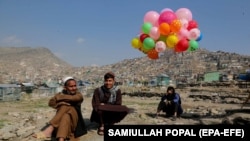
Jalal Shirzad grew up watching his home city of Mazar-e Sharif host the largest celebration of Nowruz, the Persian New Year, in Afghanistan every year, with thousands of people coming from all over the country to enjoy several days of festivities.
The celebrations would be kicked off by an ancient flag-hoisting ceremony at a religious shrine famous for its blue tiles, followed by food fairs, music and dance parties, traditional sports games, and family picnics.
But under the Taliban’s rule, Nowruz has become just another day for many Afghans, says Shirzad, a 30-year-old author from Mazar-e Sharif, the capital of the northern Balkh region.
Shirzad and several other Afghans who spoke to RFE/RL said that amid the crippling poverty and many restrictions imposed by the Taliban they have no plans to celebrate Nowruz, which falls on March 20 this year.
“There is no difference between Nowruz and any other ordinary day anymore,” Shirzad said. “People have to go to work as usual on Nowruz. It’s not even a public holiday anymore.”
The hardline Taliban group, which returned to power in Kabul in August 2021, has scrapped Nowruz as a public holiday but said people were free to celebrate it.
Taliban spokesman Zabihullah Mujahid told RFE/RL at the time that Nowruz will not be celebrated in Afghanistan officially with state-organized events, but people “will not be prevented” from marking it privately.
During its previous stint in power in the 1990s, the Taliban had banned Nowruz as a pagan holiday.
Nowruz, which marks the beginning of spring and the first day of the Persian New Year, has been celebrated in the region for more than 3,000 years.
‘The Fun Has Gone Since Taliban Came’
Many Afghans, especially women, say despite being “free to celebrate” Nowruz, many bans and restrictions imposed by the Taliban-led government don’t allow them to mark their new year in a meaningful way.
Taliban authorities have outlawed music and banned women from going to public parks and leisure facilities. Women, who must follow a strict dress code, should not even be heard in public, according to a Taliban law unveiled late last year.
Mursal, a resident of the capital, Kabul, who gave only her first name for security reasons, said Nowruz, the once-popular event, has lost its meaning for Afghans under Taliban rule. Mursal said she has no choice but to ignore Nowruz.
“I have not celebrated Nowruz since the Taliban took power. We used to have a picnic, we used to go out with family and friends, now women aren’t allowed to do any of that. All the fun and enthusiasm of Nowruz has disappeared under the Taliban,” Mursal told RFE/RL.
‘Real Nowruz Is Distant Memory In Afghanistan’
Preparations for Nowruz traditionally started several days before the new year, with several families coming together to prepare sumanak, a dish made from germinated wheat.
Households also prepared haft mewa, a salad made from seven different dried fruits served in their own syrup.
Muhammad Tahir, a Kabul resident says that most Afghans struggle to buy most basic foods, let alone ingredients for Nowruz snacks and specialties.
“Real Nowruz is a distant memory now. We used to buy new clothes, we used to go fruit shopping, we used to have fun. That’s all gone,” Muhammad said.
Written by Farangis Najibullah based on interviews conducted by RFE/RL Radio Azadi correspondent Asadullah Ludin.
Barred From Studying By Taliban, Afghan Woman Uses Tech Skills To Keep Power Running

Under the Taliban, Afghan women can't study at universities or work in most jobs.
But 22-year-old Zahra Ali has created a small business that brings in an income and provides a much-needed resource to her neighbors.
At her home workshop in Kabul, she builds rechargeable battery packs that help compensate for the country's unreliable power grid.
"I produce a lot. I can't keep up with all the orders. It's because Afghanistan faces frequent power shortages," she explains next to a work bench full of batteries, soldering irons, and electrometers.
Customers who buy the battery packs charge them when the electricity is flowing and then use them when power from the grid is intermittent or is cut off.
Before the Taliban returned to power in 2021, she studied at the Herat Institute of Technology.
Since then girls and women have been barred from secondary and higher education, and there are few places where they can work.
The Taliban has allowed limited exceptions in the health and education sectors, but these jobs come with severe restrictions and the number of women in the workforce continues to fall, according to the United Nations.
Women must also be accompanied by a male relative when traveling longer distance from their homes and can face harassment and checks even when close to home.
"It's not easy to work in the current situation. It takes a lot of effort and courage," says Ali. "I have faced many obstacles, but eventually I decided to build this workshop to generate an income, so I won't have to rely on my family and friends."
She says there were few women working in science and technology even before the Taliban resumed power, but she remains undeterred.
"Producing power banks is not a job only for men. I mean that women can do it too, but we need to work hard and be committed."
Barred From Studying, Afghan Woman Uses Tech Skills To Keep Power Running
Under the Taliban, Afghan women can't study at universities or work in most jobs. But 22-year-old Zahra Ali has created a small business that brings in an income and provides a much-needed resource to her neighbors. At her home workshop, she builds rechargeable battery packs that help compensate for the country's unreliable power grid.
EU Politicians Make Push For Radio Free Europe Funding After Trump Cuts

European Union politicians said they are continuing their push into possible support for Radio Free Europe/Radio Liberty after the US government moved to cut the Prague-based broadcaster's funding amid concerns its closure would be a blow to pro-democracy media.
Czech European Affairs Minister Martin Dvorak told reporters in Brussels on March 18 that several nations have supported the initiative so far but the bloc must act quickly as "it would be a big mistake to let this institution die."
"We must initiate some interest and meet with commissioners and some states. At this point, that initiative has been supported by seven other nations, and after we make the initiative public at the General Affairs Council, more countries will join us," Dvorak said, adding the issue needs to be resolved in a matter of "several weeks."
At the initiative of the Czech Republic, a meeting of foreign ministers from the bloc's 27 members on March 17 addressed the issue with the future of RFE/RL unclear due to the cutting of its Congress-approved funding by the administration of President Donald Trump over the weekend.
EU Countries Voice Their Support Of RFE/RL
While Dvorak said he did not want to reveal the names of the countries that have voiced their support for the move, diplomatic sources told RFE/RL that Germany, Austria, Sweden, the Netherlands, Belgium, Slovenia, Poland, the Czech Republic, and the three Baltic nations are among those who support the initiative.
"The financial challenges faced by Radio Free Europe/Radio Liberty put independent journalism at serious risk in regions where the free press is silenced, from Russia and Belarus to Iran and Afghanistan," Belgian Foreign Minister Maxime Prevot said in a post on X.
" If RFE/RL disappears, disinformation and propaganda will fill the void. That would a direct win for those who seek to undermine democracy.... Europe cannot let that happen. Protecting a free press means protecting democracy. Access to fact-based reporting is not just a principle, it is a necessity for security and fundamental freedoms," he added.
Czech Foreign Minister Jan Lipavsky said after the March 17 foreign ministers meeting that he sensed "a certain interest" from other EU members in his country's initiative, and that "it is our responsibility to seriously deal with this issue."
Radio Free Europe's Cold War History
Lipavsky's Polish counterpart, Radek Sikorski, also voiced support for RFE/RL, recalling how his father listened to the station as well as the Voice of America broadcaster during the Cold War.
"It's how we learned the basic facts about our own countries because communist propaganda was so tightly controlled," he told reporters. "And these institutions continue to do similar work for autocracies today."
Trump signed an executive order late on March 14 that aims to reduce seven federal agencies -- including the US Agency for Global Media (USAGM), which oversees Radio Free Europe/Radio Liberty and other federal broadcasters.
The order, which also targets agencies that deal with homelessness, labor disputes, and community development, gave the heads of each governmental entity named seven days to submit a report confirming full compliance.
Hours after the executive order was published, a letter from USAGM said the Congress-approved grant that funds RFE/RL, headquartered in the Czech capital, Prague, had been terminated.
RFE/RL President and Chief Executive Officer Stephen Capus said canceling the grant agreement would be "a massive gift to America's enemies," a point that was echoed by many media rights watchdogs, democracy advocates, and politicians.
Added US Senator Jeanne Shaheen, the ranking Democrat on the Senate Foreign Relations Committee: "The Trump administration's latest effort to dismantle entities established and funded by Congress that provide accurate, unbiased information to hundreds of millions of people in countries where press freedom is under attack undermines the US commitment to democracy."
'Critical Lifeline'
“If President Trump gets his way, those who depend on US-supported independent media as alternatives to Chinese and Kremlin run media outlets and those living under authoritarian regimes will lose a critical lifeline."
The USAGM is an independent US government agency that oversees the broadcasting of news and information in almost 50 languages to some 361 million people each week.
The total budget request for the USAGM for fiscal year 2025 was $950 million to fund all of its operations and capital investments.
This includes media outlets such as RFE/RL, Voice of America, Radio Free Asia, the Office of Cuba Broadcasting (Radio Marti), Middle East Broadcasting Networks (MBN), and the Open Technology Fund.
"Sweden has cosigned a Czech initiative to look for ways in which the EU and its member states can support Radio Free Europe and its role as a voice of freedom, where it is needed the most," Swedish EU Affairs Minister Jessica Rosencrantz said.
Trump, who has taken several moves to slash government spending since taking office for a second term in January, clashed with the USAGM over editorial independence and the direction of programming during his first term.
He has reiterated those concerns again since retaking office. Supporters of the broadcasters say they are an important arm of US diplomacy.
RFE/RL operates in 23 countries and 27 languages across Central and Eastern Europe, the Near East, and Central Asia.
Editor's Picks
Subscribe
Afghanistan/Pakistan Trending
Every Two Hours A Woman Dies During Childbirth In Afghanistan
2What's Behind The New Wave Of Violence In Pakistan's Balochistan?
3Hundreds Of Thousands Of Afghans In Pakistan Brace For Deportations
4Who Is Mahrang Baloch, The Rights Advocate Arrested By Pakistan On Terrorism Charges?
5Afghans No Longer Celebrate Nowruz Amid Poverty, Taliban Restrictions
6For Afghan Refugees In Pakistan, A 'Cruel' Countdown Has Begun
7American Woman Freed By Taliban, Second Release Of US Hostage In 8 Days
8Afghans 'In Extreme Despair' Amid Uncertainty Over Their US Migration
9Barred From Studying, Afghan Woman Uses Tech Skills To Keep Power Running
10Millions Of Afghan Girls Barred From School For Fourth Consecutive Year
RFE/RL has been declared an "undesirable organization" by the Russian government.
If you are in Russia or the Russia-controlled parts of Ukraine and hold a Russian passport or are a stateless person residing permanently in Russia or the Russia-controlled parts of Ukraine, please note that you could face fines or imprisonment for sharing, liking, commenting on, or saving our content, or for contacting us.
To find out more, click here.













































